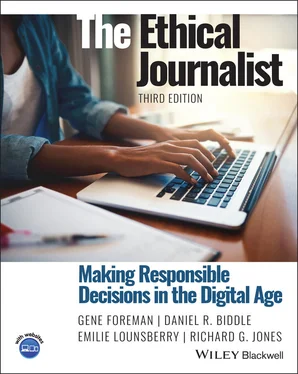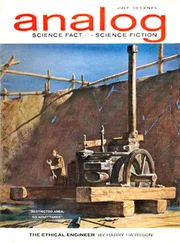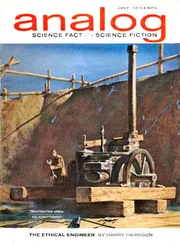Gene Foreman - The Ethical Journalist
Здесь есть возможность читать онлайн «Gene Foreman - The Ethical Journalist» — ознакомительный отрывок электронной книги совершенно бесплатно, а после прочтения отрывка купить полную версию. В некоторых случаях можно слушать аудио, скачать через торрент в формате fb2 и присутствует краткое содержание. Жанр: unrecognised, на английском языке. Описание произведения, (предисловие) а так же отзывы посетителей доступны на портале библиотеки ЛибКат.
- Название:The Ethical Journalist
- Автор:
- Жанр:
- Год:неизвестен
- ISBN:нет данных
- Рейтинг книги:5 / 5. Голосов: 1
-
Избранное:Добавить в избранное
- Отзывы:
-
Ваша оценка:
- 100
- 1
- 2
- 3
- 4
- 5
The Ethical Journalist: краткое содержание, описание и аннотация
Предлагаем к чтению аннотацию, описание, краткое содержание или предисловие (зависит от того, что написал сам автор книги «The Ethical Journalist»). Если вы не нашли необходимую информацию о книге — напишите в комментариях, мы постараемся отыскать её.
Praise for the Third Edition of The Ethical Journalist
ANN MARIE LIPINSKI,
Praise for the Earlier Editions
GENE ROBERTS,
ALICIA C. SHEPARD, The Ethical Journalist
The Ethical Journalist
The Ethical Journalist — читать онлайн ознакомительный отрывок
Ниже представлен текст книги, разбитый по страницам. Система сохранения места последней прочитанной страницы, позволяет с удобством читать онлайн бесплатно книгу «The Ethical Journalist», без необходимости каждый раз заново искать на чём Вы остановились. Поставьте закладку, и сможете в любой момент перейти на страницу, на которой закончили чтение.
Интервал:
Закладка:
The seeming conflict of those two functions – serving the public, yet making money – is often regarded cynically. Decisions about news coverage tend to be portrayed by critics as calculated to draw web traffic, raise broadcast ratings, or sell newspapers rather than to give the citizens the information they need. The truth is that good journalism is expensive, and the best news organizations invest significant sums in deeply reported projects that could never be justified in an accountant’s profit‐and‐loss ledger. If there is a pragmatic return in such projects, it is in the hope that they build the organization’s reputation as a source of reliable information.
No matter how well they do their jobs, journalists cannot expect their work to be universally acclaimed. But they have an obligation to themselves and their colleagues to never deliberately conduct themselves in a way that would justify the criticism. They have an obligation to practice sound ethics.
The Growth of Ethics Codes
For reasons that are explored in Chapter 3, journalism matured in the second half of the twentieth century. During this period, it became common for individual news organizations to articulate their ethics standards in comprehensive codes, which could be useful guides in decision‐making about the news. Today, not only professional organizations of journalists, but also individual news sites, broadcast stations, and newspapers typically have ethics codes.
There is a distinct difference in the effect of the codes adopted by organizations of professional journalists and those adopted by individual newsrooms. Although the codes of professional organizations fulfill an important purpose of establishing profession‐wide standards, they are voluntary and cannot be enforced. But, when a newsroom adopts a code, violations can be addressed by suspending or dismissing the violators. Of course, codes are valuable only to the extent that they are practiced, and newsroom leaders have a responsibility both to enforce their codes and to set an example of propriety.
Journalists new to the profession may be surprised to find that the rank‐and‐file reporters, editors, and photojournalists often are more effective than their bosses in enforcing the code. John Carroll, when he was editor of the Los Angeles Times , said that among journalists “certain beliefs are very deeply held,” and that the core of these beliefs is a newspaper’s duty to the reader – that is, the news consumer, the audience, no matter how the news is delivered.
Carroll said, “Those who transgress against the reader will pay dearly,” adding that this intensity usually is masked by a laid‐back newsroom demeanor. “There’s informality and humor, but beneath the surface lies something deadly serious. It is a code. Sometimes the code is not even written down, but it is deeply believed in.” 4See John Carroll’s Point of View essay, “A ‘Tribal Ferocity’ Enforces the Code,” at the end of this chapter for more of his thoughts on the subject.
The Goal: Ethical Decision-Making
In this text and in the ethics course you are studying, you will continue your preparation for a journalism career by examining how good journalists make responsible decisions. The text will identify and discuss the principles of applied ethics that are a foundation for sound decision‐making. As the course progresses, you will practice your decision‐making skill in case studies. The goal is to encourage you to think critically and in concrete terms about the situation confronting you – to employ logic rather than respond reflexively.
You should know that there are capable, intelligent journalists who reject the idea that journalism ethics can be taught in a college course. They argue that journalists, and journalism students, either are honorable, or they are not. If they are honorable, this hypothesis continues, they will automatically make the right decision and so do not need this course. If they are not honorable, no college course is going to straighten them out. As an esteemed editor remarked to a college audience, “If your mom didn’t teach you right from wrong, your college teacher is not going to be able to.”
Although there is truth to that statement, it misses the point. The authors of this textbook assume that you did learn honesty and propriety in your early, formative years. In fact, this course is intended to build on your own sense of right and wrong and to show how to apply that sense to solving ethics problems in the profession.
Sometimes journalists have conflicts in values that their fellow citizens do not. For example, your mom would instruct you to always go to the aid of someone in need. However, journalists might have to weigh intervention to help one person against their duty to inform the public about thousands of other people in the same sort of adversity. If they intervene, they destroy the story’s authenticity – and they fail to inform the public.
Another flaw in the critics’ argument is the presumption that honorable journalists will reflexively do the right thing. Your mom may not have taught you a decision‐making procedure. As you will discover, “the right thing” is not always obvious. You will see that sound decision‐making goes beyond instinct and carefully considers – in a process called critical thinking – the pros and cons of various courses of action.
Honing Skills Through Cases
The case‐study method gives you a chance to work through difficult decisions in the classroom without consequences and without deadline pressure. The experience will prepare you for making on‐the‐spot ethical decisions in the real world. Each of the case studies selected for class discussion is intended to teach an important nuance about news media ethics.
In addition to explaining the principles of journalism ethics and teaching a decision‐making process, this course in journalism ethics gives you two valuable opportunities:
You can study the thinking of academics and experienced practitioners on recurring problems that journalists face. You can draw on the trial‐and‐error efforts of people who have gone before you in the profession.
You can practice your decision‐making technique in a classroom setting where no one is hurt if a decision proves to be flawed. Just as a musician, an actor, or an athlete improves through practice, you benefit by thinking through the courses of action you might take in the case studies. You should emerge from the course with a deeper understanding of the challenges of the profession and with more confidence about your own decision‐making.
You should also keep in mind that an applied‐ethics course prepares you for a career in which you will be dealing with people who want to influence the way you report the news. Because journalists work for the public, it would be a betrayal of the public’s trust to allow themselves to be diverted from the truth. The ethicist Bob Steele describes the manipulators:
You will be stonewalled by powerful people who will deter you from getting to the truth. You will be manipulated by savvy sources who do their best to unduly influence your stories. You will be used by those with ulterior motives who demand the cover of confidentiality in exchange for their information. You will be swayed by seemingly well‐intentioned people who want to show you some favor in hopes that you, in return, will show them favoritism in the way you tell their story.5
A cautionary note is in order. Although ethical considerations may occasionally cost you a story, being an aggressive reporter and being ethical are not mutually exclusive. Keep in mind that your job is to inform your audience, and that means being a good, resourceful reporter who gets the story on the web, on the air, or into the newspaper.
Читать дальшеИнтервал:
Закладка:
Похожие книги на «The Ethical Journalist»
Представляем Вашему вниманию похожие книги на «The Ethical Journalist» списком для выбора. Мы отобрали схожую по названию и смыслу литературу в надежде предоставить читателям больше вариантов отыскать новые, интересные, ещё непрочитанные произведения.
Обсуждение, отзывы о книге «The Ethical Journalist» и просто собственные мнения читателей. Оставьте ваши комментарии, напишите, что Вы думаете о произведении, его смысле или главных героях. Укажите что конкретно понравилось, а что нет, и почему Вы так считаете.











